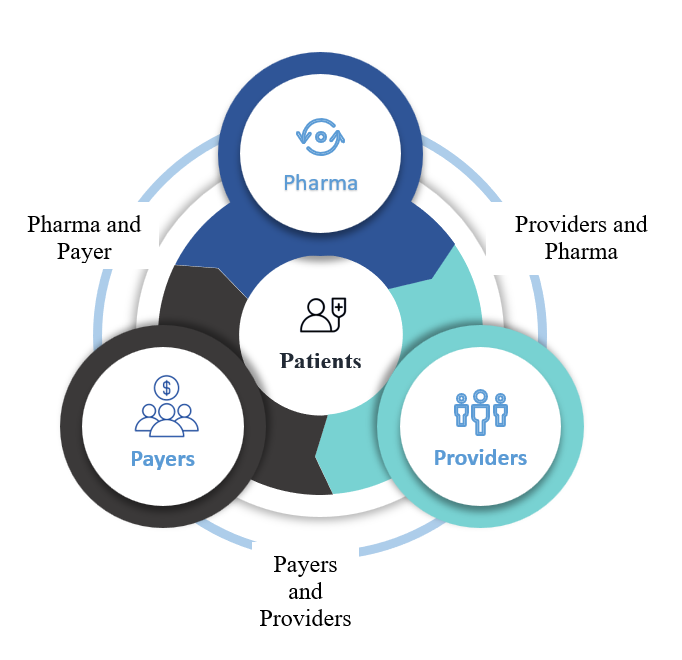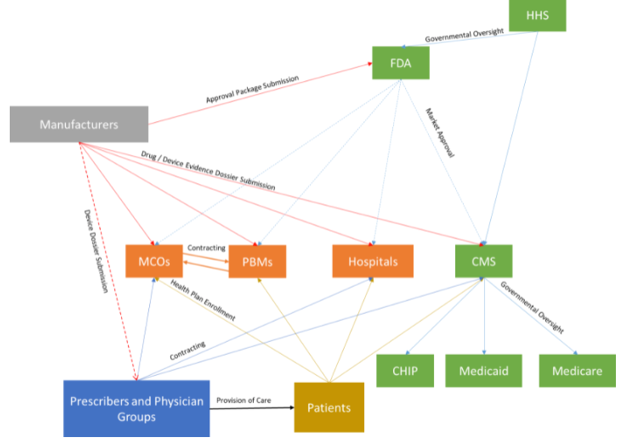In the complex landscape of the pharmaceutical industry, payers play a pivotal role in shaping the dynamics of market access and reimbursement. Understanding the distinctions of the payer structure, their roles, and responsibilities is crucial for pharmaceutical companies aiming to navigate the complex healthcare ecosystem. This article delves into the essential aspects of payer engagement, emphasizing the importance of tailored and data-driven approaches and shedding light on the significance of payer research.
Who are Payers?
Payers are entities responsible for financing and managing healthcare services. They can take various forms, including health insurance companies, government health programs, pharmacy benefit managers (PBMs), and managed care organizations. These entities wield significant influence in determining which pharmaceutical products gain access to the market and at what cost.
Types of Payers
Within the pharmaceutical industry, various types of payers exist, each with distinct characteristics. These include private health insurers, government payers (Medicare and Medicaid), pharmacy benefit managers, employer-sponsored health plans, and accountable care organizations. Understanding the differences among these payer types is vital for crafting effective market access strategies.
Key Healthcare Decision Makers
Payers Roles and Responsibilities
Payers are entrusted with crucial responsibilities such as evaluating the clinical and economic value of pharmaceutical products, negotiating pricing and reimbursement agreements, and making coverage decisions. Their role extends beyond financial considerations to ensuring that patients receive optimal and cost-effective healthcare solutions
Importance of Payers in Pharma
The significance of payers in the pharmaceutical landscape cannot be overstated. They act as gatekeepers, influencing the market access and adoption of new drugs. For pharmaceutical companies, engaging effectively with payers is paramount to secure favorable reimbursement terms and achieve market success
Concept of Tailored and Data-driven Payer Engagement
Tailored and data-driven engagement with payers involves customizing interactions based on the specific needs and priorities of each payer. This approach requires a deep understanding of individual payer requirements, allowing pharmaceutical companies to provide targeted information and evidence that aligns with payer expectations
Why Payer Research is Important?
Payer research serves as the foundation for successful market access strategies. Conducting thorough research enables pharmaceutical companies to comprehend the landscape, identify key stakeholders, and adapt their value proposition to meet payer needs. It also helps in anticipating market trends, addressing potential barriers, and ensuring that products align with payer preferences
Digital Payer Engagement Strategies
In the era of digitization, embracing digital payer engagement strategies is crucial for effective communication. Utilizing digital platforms enables pharmaceutical companies to disseminate information efficiently, engage with payers remotely, and streamline the exchange of relevant data. Digital tools also facilitate real-time interactions, improving overall engagement and collaboration
In conclusion, understanding the payer structure and engaging with payers effectively are paramount for pharmaceutical companies navigating the complex healthcare landscape. By adopting custom-made, data-driven, and digital strategies, companies can forge meaningful relationships with payers, ensuring optimal market access and successful product adoption.




